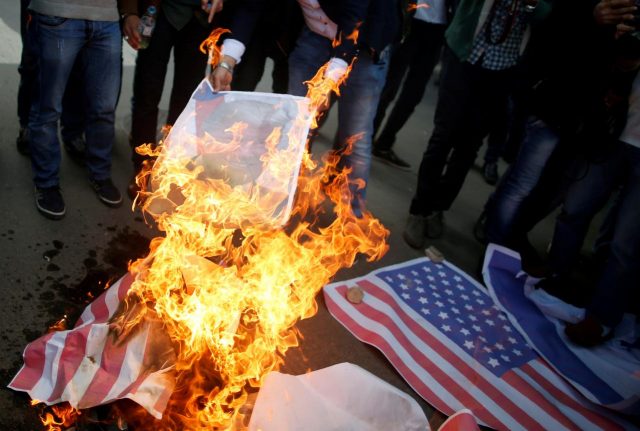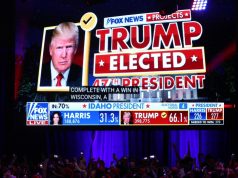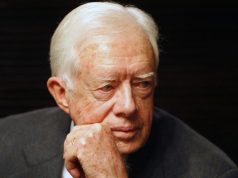
Peter Van Buren, a 24-year State Department veteran, is the author of We Meant Well: How I Helped Lose the Battle for the Hearts and Minds of the Iraqi People and Hooper’s War: A Novel of WWII Japan. @WeMeantWell
Donald Trump’s formal recognition of Jerusalem as the capital of Israel, reversing some seven decades of American policy, is arguably the most unnecessary decision of his time in office and one that will have consequences lingering far past his tenure. The decision may yield some domestic political advantage among Jewish and evangelical Christian voters for the president, but at irrationally high expense globally.
Jerusalem is where Israel’s president presides, and where the parliament, supreme court, and most government ministries are located. In practical terms, it is the capital. However, unlike in nearly every other nation, the United States maintains its formal embassy in another city, Tel Aviv. It keeps a consulate in West Jerusalem and a consular annex in East Jerusalem, the part of the city annexed by Israel in 1967 and expected by many Palestinians to be the capital of their future state. Washington also has an office directly on the Green Line, the division point between Israel and the Palestinian territories.
Diplomats, as well as Israeli officials, understand normally an embassy is the head office located in the capital, and a consulate is a less important branch located elsewhere. But they also know from experience in Israel which door to knock on when they need to get business done, regardless of what the nameplate reads out front.
This kind of thing is not unique to Israel. A similar system in Taiwan has kept the peace there.
In 1979 the United States recognized the reality of the People’s Republic of China, with Beijing as its capital, and shifted formal relations from Taiwan. Instead of an embassy in Taipei, the United States established the American Institute in Taiwan. An actual registered nongovernmental organization, the Institute benefits from the Department of State providing “a large part of funding and guidance in its operations,” never mind the entire staff. Yet there is no ambassador at the Institute; the chief representative is called the director. A whole sitcom worth of diplomatic parlor tricks keeps the enterprise in Taipei not an embassy of the United States.
That all allows Washington, Taipei and Beijing to focus on the practical work of relations without having to address the never-gonna-resolve-it-in-our-lifetimes geopolitical questions first. That’s why these things matter. That’s why Trump’s decision to officially recognize Jerusalem as Israel’s capital and relocate the embassy pulls down the curtain, turns on the lights, and spray-paints day-glo yellow the 500-pound gorilla in the room.
In the case of the United States and Jerusalem, the kabuki which has maintained the status quo is the Jerusalem Embassy Act of 1995. Under the act, the American headquarters stayed in Tel Aviv, business was done as needed, and everyone with a hand in the complex politics of the Middle East could look whichever way best fit their needs.
That law did require the United States to relocate its embassy to Jerusalem by 1999, but a politically expedient loophole allowed presidents to issue a waiver of the requirement every six months for national security reasons, thereby preventing Congress from exercising its power to withhold half the funds appropriated to the State Department for overseas building operations if the deadline wasn’t met.
Trump reluctantly issued the waiver a few months ago and then again just after announcing his recognition of Jerusalem, giving the State Department some bureaucratic breathing room on the funding issue while he plans to build a new structure somewhere in Jerusalem — a project that could take years.
The Jerusalem Embassy Act was a practical solution, not a failed plan that did not lead to formal peace between the Palestinians and Israel as Trump characterized it. The shadowplay status of Jerusalem worked.
No more. Trump’s action demands all players set aside whatever other issues they have in Israel, not the least of which is the Palestinian peace process, and instead take a stand on America’s changed position.
Trump’s decision has provoked a global uproar, with world leaders criticizing the move as irresponsible and dangerous. Of immediate concern is America’s relationship with Jordan. Jordan has thrown in heavily with the United States, allowing its territory to be used as an entry point into Syria for American aid. The United States and Jordan broadly have a robust and multi-layered security arrangement, working well together in the war on Islamic State. It has been a steady relationship, albeit one often based on personal ties more than formal agreements, according to several American diplomats I spoke with.
Yet following Trump’s announcement, Jordan’s King Abdullah II warned of “dangerous repercussions on the stability and security of the region.” The issue of Jerusalem runs deep in Jordan: it was Abdullah’s father, King Hussein, who lost East Jerusalem to Israel in the 1967 war, and Abdullah himself, under a 2013 agreement between Jordan and the Palestinian Authority, is the custodian of the Muslim and Christian holy sites in Jerusalem. American diplomats working in Amman will find every facet of the relationship colored and their skills tested — no Arab ruler can be seen being publicly pushed around, perhaps humiliated, by the United States.
A second blow could come in Washington’s relationship with Egypt. More so than Jordan, Egypt’s rulers must act in awareness of public opinion, with memories of the Arab Spring still fresh. In response to Trump’s announcement, Egyptian parliamentarians called for a boycott of American products, including weapons purchases. Egypt is also no stranger to the dangers of Islamic fundamentalism, and one Egyptian minister warned Trump’s decision would shift focus from fighting terrorists to inflaming them. The role Jerusalem plays in the radical Islamic canon cannot be over-estimated. And all of this comes at a sensitive time: Cairo just reached a preliminary agreement to allow Russian military jets to use Egyptian airspace and bases for the first time since 1973.
In the coming days there will be violence and protests. But long after the tear gas clears, American diplomats will find themselves hamstrung — entering negotiations on a full range of issues having to first somehow address the action taken by Trump. This is not an unnecessarily bombastic tweet that runs off the bottom of the page, or a crude remark which fades with the next news cycle: this time, the president overturned a working policy and the effects will resonate long after he leaves the White House.









